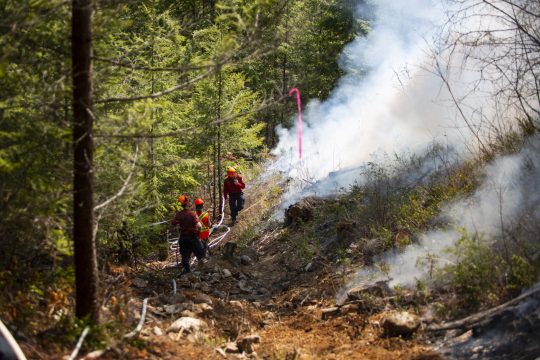Business advisory services educate entrepreneurs, including this Creston apiarist
How to hire good employees. How to lead them well. How to read your financials. In addition to helping keep about 400 colonies of bees healthy and productive, and producing award-winning honey, these are some of the topics that Amanda Goodman Lee has been brushing up on lately.
“It’s impossible to learn everything at once,” says the co-owner of Honey Bee Zen Apiaries in Creston. “And as your business grows and grows and grows, it’s always changing.”



Recently, participating in a free learning series offered through Columbia Basin Trust has enabled her to expand her skills.
Honey Bee Zen Apiaries is one of the largest producers of natural raw honey in the Columbia Basin. In addition to raising thousands of bees, it produces honey under the names Honey Bee Zen and Swan Valley, and supplies it to about 40 stores. “There’s probably no place where we haven’t got honey in some form or another in the Kootenays,” says Goodman Lee’s husband and partner Jeff Lee.
There’s also beeswax candles and lip balms, beekeeping courses and honey judging, providing pollination units to Creston Valley orchards, and more. In other words, the apiary has lots going on.



To keep on top of it, Goodman Lee has taken multiple offerings through the Trust’s Basin Business Advisors program.
For example, she completed the On-Farm Recruitment and Readiness Series, which helped farmers and food producers plan how to hire, onboard and retain workers for the 2024 season. Topics included items like writing appealing job descriptions and the ins and outs of conducting interviews.
“I got some really valuable information,” she says.



In the Learning Leadership Pathway, she learned how to implement a reliable blueprint so she can guide her team toward desired results. One step, for example, was to place herself in what she dubs the CEO chair. Before, “I was working too much in my business,” she says, “and not on my business.”
Now, she has an organizational chart and has drafted an employee handbook; roles are clear, and she knows who reports to whom and what tasks belong on which person’s plate.
In addition to online workshops, these programs feature working groups. Here, participants—representing a range of small businesses around the Basin—discuss issues and solutions with each other.
“You realize that you’re not alone,” she says. “The challenges that I’m having are similar to what other small businesses are having. Some people shared their mistakes and helped me learn, and I hope people learned from mine as well.”
Plus, Goodman Lee has benefited from one-on-one time with a business advisor, “where you can really dive down into your business” and get an informed outside perspective.



She also completed the on-demand Financial Fundamentals series, which boosted her knowledge on topics like cost of goods sold and gross margins. Whereas reviewing her books used to put a knot in her stomach, she now feels “empowered by having the language that I can speak to my accountant with.”
Altogether, the program has had immense impact. As someone who once said, “I can’t keep up and I’m spread so thin,” she now says, “I feel lighter.” Her vision for the company’s future is stronger. “In these courses, I am really forcing myself out of my comfort zone. And I think as a business owner, we have to.”
Which is why she encourages other business owners to take advantage of such offerings, delivered by the Trust in the aim of helping keep Basin businesses strong as they create local employment and, in the apiary’s case, provide access to locally grown food. “We are so lucky to have this program available to us.”













